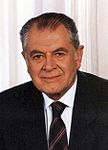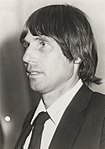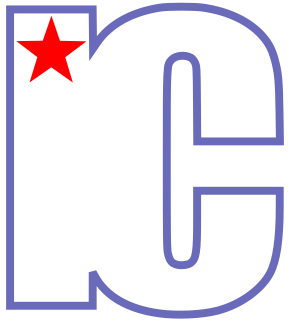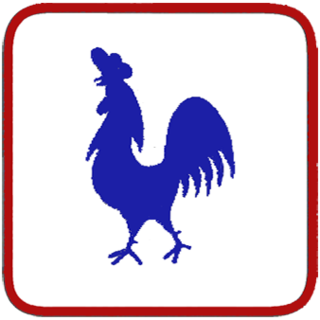| |||||||||||||||||||||||||
| |||||||||||||||||||||||||
| |||||||||||||||||||||||||
 |
|---|
| This article is part of a series on the politics and government of Chile |
| Comptroller General |
| Constitutional Court |
|

General elections were held in Chile on 14 December 1989, [1] bringing to an end the military regime that had been in place since 1973. Patricio Aylwin of the Coalition of Parties for Democracy alliance was elected President, whilst the alliance also won a majority of seats in the Chamber of Deputies and in the elected Senate seats.

Chile, officially the Republic of Chile, is a South American country occupying a long, narrow strip of land between the Andes to the east and the Pacific Ocean to the west. It borders Peru to the north, Bolivia to the northeast, Argentina to the east, and the Drake Passage in the far south. Chilean territory includes the Pacific islands of Juan Fernández, Salas y Gómez, Desventuradas, and Easter Island in Oceania. Chile also claims about 1,250,000 square kilometres (480,000 sq mi) of Antarctica, although all claims are suspended under the Antarctic Treaty.
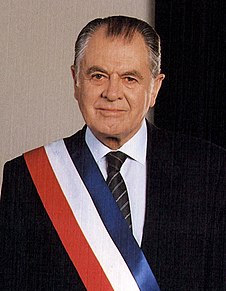
Patricio Aylwin Azócar was a Chilean politician from the Christian Democratic Party, lawyer, author, professor and former senator. He was the first president of Chile after dictator Augusto Pinochet, and his election marked the Chilean transition to democracy in 1990. Despite resistance from elements of the Chilean military and government after his election, Patricio Aylwin was staunch in his support for the Chilean National Commission for Truth and Reconciliation which exposed the Chilean government's brutalities.

The Honourable Chamber of Deputies of the Republic of Chile is the lower house of Chile's bicameral Congress. Its organisation and its powers and duties are defined in articles 42 to 59 of Chile's current constitution.
Contents
From the 1989 elections onwards the military had officially left the political future of the country to civilians to be elected. Pinochet did not endorse any candidate publicly. Former dictatorship minister Hernán Büchi ran for president as candidate of the two right-wing parties, RN and UDI. He had little political experience and was a relatively young (40 years) technocrat credited for Chile's good economic performance in the later half of the 1980s. The right parties faced several problems in the elections: there was considerable infighting between RN and UDI, Büchi had only very reluctantly accepted to run for president and right-wing politicians struggled to define their position towards the Pinochet regime. In addition to this right-wing populist Francisco Javier Errázuriz Talavera ran independently for president and made several election promises Büchi could not match. [2]

Hernán Alberto Büchi Buc is a Chilean economist who served as minister of finance of the Pinochet dictatorship. In 1989 he ran unsuccessfully for president with support of Chilean right-wing parties.

National Renewal is a liberal conservative political party belonging to the Chilean centre-right political coalition called Chile Vamos in conjunction with the Independent Democratic Union (UDI), the Independent Regionalist Party (PRI) and Political Evolution (Evópoli). The party president is the deputy Mario Desbordes, and its principal leaders are Sebastián Piñera, current President of Chile and Andrés Allamand, former minister of defense, former presidential candidate and Senator.
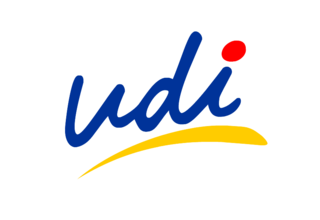
The Independent Democratic Union is a Chilean right-wing, conservative political party, founded in 1983. Its founder was the lawyer, politician and law professor Jaime Guzmán, a civilian who collaborated with Augusto Pinochet and a member of the Opus Dei. Guzmán was a senator from 1990 until his assassination on April 1, 1991.
The centre-left coalition Concertación was rather united and confident. Its candidate Patricio Aylwin, a Christian Democrat, behaved as if he had won and refused a second television debate with Büchi. Büchi attacked Aylwin on a remark he had made concerning that inflation rate of 20% was not much and he also accused Aylwin of making secret agreements with the Communist Party of Chile, a party that was not part of Concertación. [2] Aylwin spoke with strength about the need to clarify human rights violations but did not confront the dictatorship for it, in contrast Büchi as a regime collaborator lacked any credibility when dealing with human right violations. [2]

The Concertación was a coalition of center-left political parties in Chile, founded in 1988. Presidential candidates under its banner won every election from when military rule ended in 1990 until the conservative candidate Sebastián Piñera won the Chilean presidential election in 2010. In 2013 it was replaced by New Majority coalition.

The Christian Democratic Party is a Christian democratic political party in Chile and governs as part of the Nueva Mayoría coalition.

The Communist Party of Chile is a Chilean political party inspired by the thoughts of Karl Marx and Vladimir Lenin. It was founded in 1922, as the continuation of the Socialist Workers Party, and in 1932 it established its youth wing, the Communist Youth of Chile.
Büchi and Errázuriz lost to Patricio Aylwin. The electoral system meant that the largely Pinochet-sympathetic right was overrepresented in parliament in such way that it could block any reform to the constitution. This over-representation was crucial for UDI to obtain places in parliament and secure its political future. Pinochet declared himself to be satisfied with the election. The far-left and the far-right performed poorly in the election. [2]
